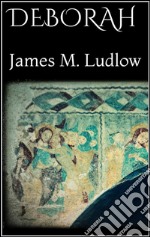Ludlow eBooks
eBooks di Ludlow di Formato Epub
The Hasheesh Eater . E-book. Formato EPUB Fitz Hugh Ludlow - Enhanced Media Publishing, 2017 -
First published in 1857, American author Fitz Hugh Ludlow’s The Hasheesh Eater is one of the first examples of addiction literature. The book recounts Ludlow’s initial fascination and subsequent addiction to hasheesh (hashish), and includes many detailed descriptions of the hallucinations he experienced while under the influence of the drug, a version of cannabis which he ingested in pill form.
Deborah. E-book. Formato EPUB James M. Ludlow - Pubme, 2017 -
King Antiochus, self-styled Epiphanes, the Glorious, was in a humor that ill-suited that title. He cursed his scribe who had just read to him a letter, kicked away the cushions where his royal and gouty feet had been resting, and strode about the chamber declaring that, by all the gods! he would make such a show in Antioch that the whole world would be agog with amazement.The letter which exploded the temper of his majesty was from Philippi, in Macedonia, and told how the Romans, those insolent republicans of the West, had made a magnificent fête to commemorate their conquest of the country of Perseus, the last of the kings of Greece.Epiphanes was a compound of pusillanimity and conceit. He could forget the insult offered by a Roman officer who drew about "The Glorious" a circle in the sand, and threatened to thrash the kingship out of him if he did not at once desist from a certain attempt upon Egypt; but he could not endure that another should outshine him in the pomp for which Antioch was famous. This Eagle of Syria, as he liked to be called, would rather have his talons cut than lose any of his plumage.
The Age of the Crusades. E-book. Formato EPUB James Ludlow - Blackmore Dennett, 2019 -
CARDINAL BARONIUS, the historian of the church down to the year 1198, designated the period which then closed as the Dark Ages. The propriety of the title has insured its perpetuity. The era of the crusades is almost evenly divided by the date which all scholars, following Baronius, regard as marking the end of the worst and the beginning of better times. The eleventh and twelfth centuries were the battle-ground on which the grim spectres of the old met the bright advancing spirits of the new civilization. It must be remembered that the peoples then dominant were the descendants of those barbaric hordes whose irruption from northern Europe and western Asia had swept away the Roman empire. The fierce spirit of the Frank in Gaul, of the Goth in Spain, and of the Lombard in Italy was not yet tempered by the arts and philosophy their fathers had so nearly destroyed, and whose renaissance had not yet begun. It was but a few generations since the people that had inherited the Roman civilization had been largely exterminated. So complete had been the ravage that in the eighth century much of the land in Italy still remained forest and marsh, a condition to which it had reverted. Parcels of ground were purchased by strangers as eremi, the title secured by the fact of having cleared and cultivated any given spot. The reader can readily paint his own picture of the society which settled these lands by recalling such facts as that from 900 to 930 Italy was under the Huns; in 911 Normandy was conquered by Rollo the Dane; in 1029 the Normans possessed themselves of the south of Italy. Culture, however, was not entirely extinct. The age produced many fine specimens of what is best in manhood and womanhood, although, in comparison with the general condition, these were like sporadic bushes on the breast of a land-slide, whose roots have maintained their hold through the rushing debris, or which have sprung up afresh in the new soil...


